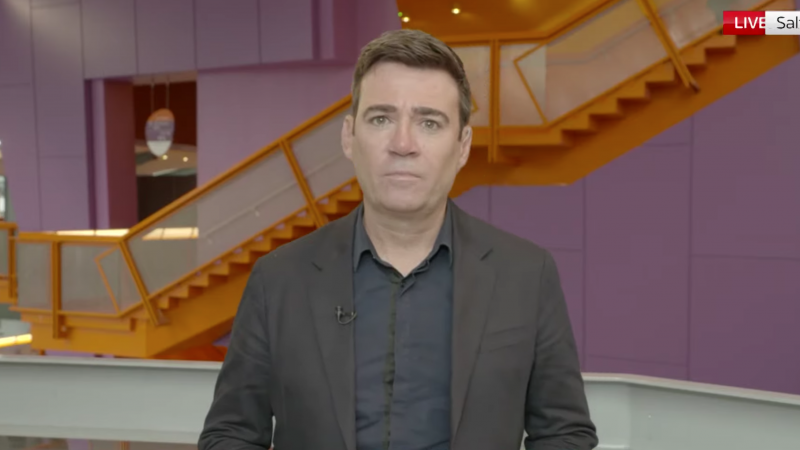
Greater Manchester is set to become the first city region in the country to ratify an accelerated plan for removing carbon from the economy, with a commitment to reduce emissions by one million tonnes over the next three years.
In a Sky News interview this morning, Andy Burnham declared that he will ask attendees at the fourth Greater Manchester green summit to support the plan, allowing the region to meet its target to achieve net zero by 2038.
“We are making progress towards our goal of being net zero by 2038, but if I’m honest with you we are not going fast enough, and that’s why we’re making this commitment, and it’s gone to government in the form of a levelling up deal,” the mayor said.
“I’m in the unique position of being the only mayor who’s taken the decision to put buses back under public control outside of London, and because of that I have more ability to decide what buses are on our roads and therefore electrify the bus fleet.
“So, I’m saying to the government, really if you can back us with the investment now in the spending review coming next week, we can accelerate our journey towards net zero. And if Greater Manchester hits 2038, Adam, it’s going to be much more likely that the whole of the country then will hit 2050.”
The summit will be attended by more than 1,000 delegates today. Those present will consider the plan put forward by Burnham, which includes commitments to improved walking and cycling routes and a plan to electrify up to 50% of Greater Manchester’s buses over the next four years.
Burnham has also established a ‘buildings retrofit taskforce’ to reduce emissions from homes and public buildings, and the authority plans to increase the amount of renewable energy produced locally in order to reduce emissions and bills.
A report published earlier this year, the culmination of 14,000 separate studies and the first major review of climate change from the UN’s intergovernmental panel on climate change since 2013, stated that it is “unequivocal that human influence has warmed the atmosphere, oceans and land”.
The document set out five scenarios for the future of climate change with varying degrees of severity projected, but all scenarios predicted that the 1.5˚C increase will be reached by 2040 and sooner if emissions are not reduced.
Countries have been asked to come to COP26, being hosted in Glasgow next month, with plans to reduce greenhouse gas emissions. The Greater Manchester target to achieve net zero by 2038 is 12 years ahead of the national UK target of 2050.
Keir Starmer recommitted the Labour Party to achieving the “substantial majority” of greenhouse gas emission cuts by 2030 during an interview with The Independent earlier this year, a pledge made by previous leader Jeremy Corbyn.
Labour set out a plan for a drive towards a clean economy focusing on the UK manufacturing sector last November, calling for a rapid stimulus package of at least £30bn over the next 18 months with dedicated funding to low-carbon industries.
Rachel Reeves announced at the annual Labour Party conference last month that the party in government would invest £28bn of capital investment towards the transition to a green economy for each year of this decade.
The Shadow Chancellor warned that delaying in tackling climate breakdown would be the “greatest cost to public finances, as well as to our planet”, and told conference that she would not “shirk our responsibility to future generations”.




More from LabourList
Government announce SEND reform in schools white paper
SPONSORED: ‘Industrial hemp and the challenge of turning Labour’s priorities into practice’
‘A day is a long time in politics, so we need ‘action this day’’